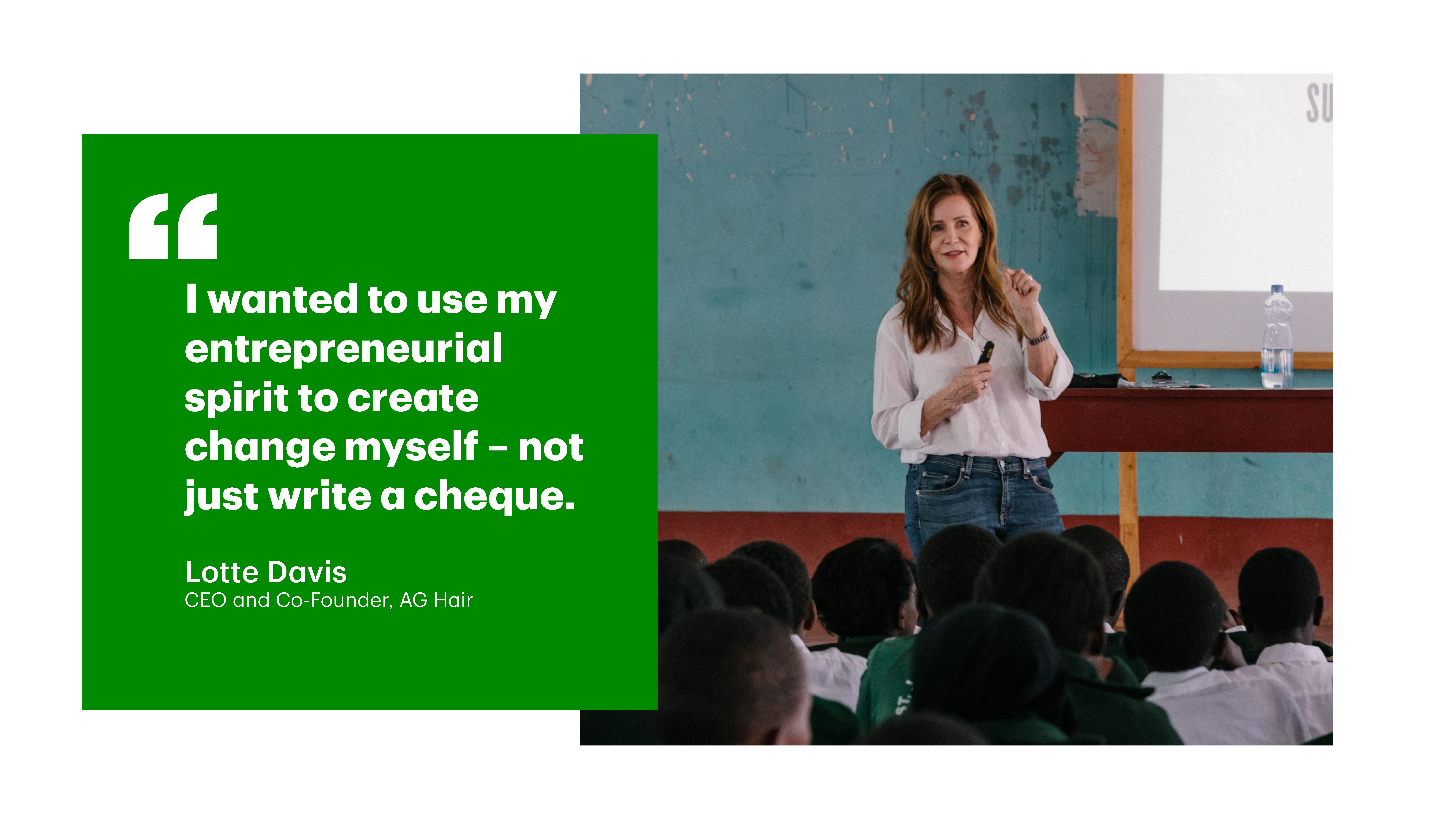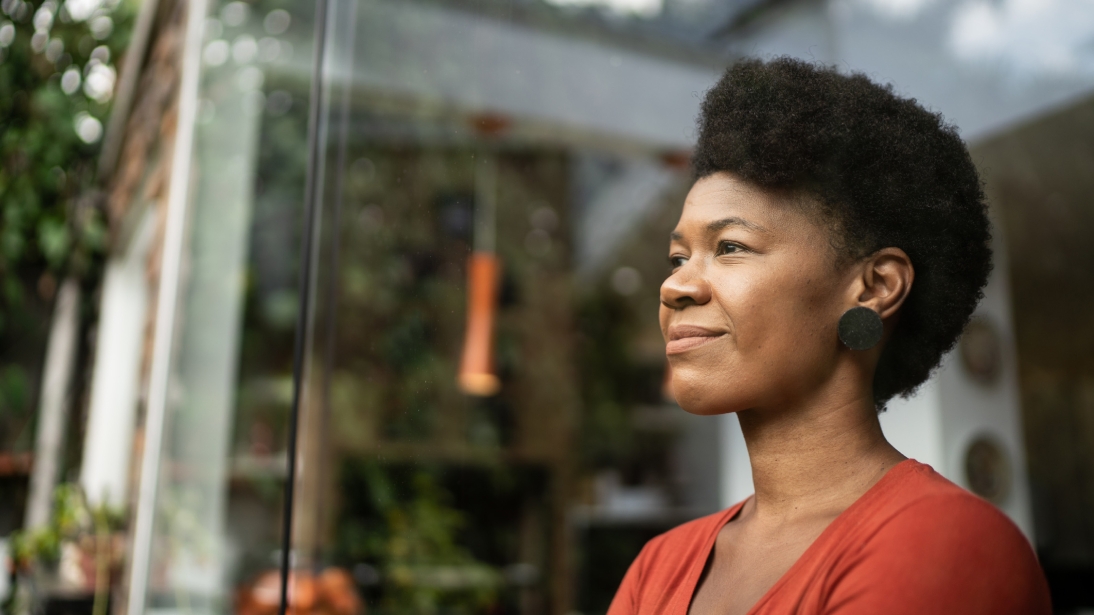Growing up during apartheid in South Africa, entrepreneur Lotte Davis saw the ways in which racism affected who could gain access to jobs and higher education, and who could not. Even as a child, she felt the inequality she witnessed was fundamentally wrong.
Her family moved to Canada when she was 10 years old to escape South Africa’s political climate. As Davis entered the workforce in the 1970s, she noticed another form of discrimination that can affect career-advancement opportunities: sexism. She experienced gender discrimination and workplace sexual harassment, and eventually decided to start her own business, one where she could call the shots. She launched hair-care product line AG Hair with her husband in 1989 in the basement of their Vancouver home.
As their business grew and became more successful, Davis’s childhood paired with her own professional experiences remained a driving force. She was determined to use her financial success to provide opportunities to women who might not have them otherwise and prove that women are just as smart and capable as men.
“I really yearned to try to change the lives of other young women and had a strong desire to go back to Africa to do it,” she said.
Now that’s she achieved professional success, she’s using her money to help others.
Davis uses proceeds from AG Hair – one of the largest independent manufacturers of professional hair-care products in Canada – towards philanthropic efforts, including her own charitable organization, One Girl Can. The organization, which Davis founded in 2008, gives girls and women in Kenya access to education, job training and mentorship opportunities to help tackle the issues of poverty and gender inequality in the country.
“I wanted to use my entrepreneurial spirit to create change myself – not just write a cheque,” she said.
Davis is one of the many female philanthropists changing the Canadian charity landscape by pouring their money into causes that resonate with them personally, but which also have a broader societal impact.
According to a new TD Wealth report, titled “Trust and Transformation: Canadian Women and Philanthropy,” donations claimed by women in Canada in annual tax filings nearly tripled to $4.3 billion in 2021, up from $1.5 billion in 2011. According to the report, at current rates of growth, donations claimed by women are projected to reach $5.9 billion by 2030. (Read the report here.)
With wives, spouses, and daughters set to inherit $1 trillion over the next decade as Baby Boomers and their parents pass away, women are a driving force in Canadian philanthropy. Put simply, the country’s almost 86,000 charities would not function without their support, the report found.
"Not only do women provide much-needed funding and a cadre of volunteers, but women participating in the sector are increasingly driving systemic change,” said Jo-Anne Ryan, Vice President, Philanthropic Advisory Services at TD Wealth.
The power of trust and the desire to make a difference
Women have been involved in charitable work for decades, but their philanthropy might have gone unrecognized or overlooked in the past, according to a 2014 report out of University of California, Los Angeles called “Gifts from the heart.” Men, for many years, were often seen as top donors and financial decision-makers.
But women today, especially younger ones, are more willing to self-identify as philanthropists and publicly use their money – both independently earned or inherited – to help make a difference.

The report by TD Wealth – which is based on interviews with approximately 60 women from across the country – found that for female Canadian philanthropists, simply donating money for tax purposes is not a key motivator. Instead, their giving is often motivated by family experiences, social awareness of current events and humanitarian crises, the influence of friends, and growth in their own financial resources.
Recent national and international events including the pandemic, the Black Lives Matter movement, the #MeToo movement and the National Inquiry into the Missing and Murdered Indigenous Women and Girls have further prompted women to put their money towards timely causes, Ryan said.
According to the TD Wealth report, these donors want to trust that their money is going to be used effectively and value seeing the impact of their donations. To help ensure they are making a positive contribution, women tend to do more homework than men on a charity or organization before deciding to donate to them, Ryan said. This might mean volunteering to see how an organization is run, or interviewing the board to get a sense of who is making decisions.
“Women ask a lot of questions, and they will look at the make-up of the board to see if it represents the people that the organization serves,” Ryan said. “For example, if it’s an organization that serves an Indigenous community, does the board reflect that, or is it a bunch of people thinking they know how to serve that community?”
A new approach tailored to women
This shift in wealth and giving behaviour is causing charities and institutions alike to adapt their fundraising efforts. Because men were often the top-earners and therefore seen as the decision-makers when it came to philanthropic donations, many charitable organizations – and even financial advisors – primarily spoke to them, often overlooking the wife or children, Ryan said.
This approach no longer works as women are increasingly in control of their family’s finances, whether it be from inheritance, divorce or independently earned.
“Just like there are strategies for business development, charities have strategies for fundraising. What they're realizing is that you can't have a one-size-fits-all approach in terms of how you go out to donors to get money,” Ryan said.
“They must have an engagement strategy for women and build relationships with them, and perhaps provide more information on their charity because women do more due diligence.”
Creating a legacy
As more women take on professional leadership roles or start their own companies, incorporating philanthropy into their business models is an important consideration for many of them.
The TD Wealth report found that female entrepreneurs are fundamental drivers of the Canadian economy and a source of major gifts to the charitable sector. Many believe that charities need to behave like a business by intentionally seeking investment and talent to support their cause.
For Davis, running One Girl Can with the same mindset that she runs AG Hair, in terms of setting goals and developing strong marketing materials, has helped the charity grow. Having a for-profit business model that incorporates philanthropy – a portion of proceeds from AG Hair products go towards supporting the nonprofit – has also been incredibly useful for helping sustain the charitable organization.
“Initially, I didn't think our business could be a vehicle for raising money; philanthropy was a personal goal,” Davis said. “But employees wanted to be involved, and then customers wanted to be involved. We’re in the hair-care business, which is comprised of 90 per cent women. For them, it made a huge difference to know that we were using our profits to help other women achieve their goals in life.”
With more women set to come into money in the next decade, according to the TD Wealth report, Ryan said it’s important that philanthropy becomes part of not just business planning, but wealth planning, too. Families should speak to financial advisors about their charitable goals so they can help them strategically figure out the best way to support causes that matter most to them.
Plus, Ryan believes there is real value in women coming forward and publicly attaching their names to their philanthropy, whether it’s through a large gift or starting a foundation. While it might feel like boasting, it has a larger purpose.
“Women should continue to come forward with bolder self-branding to encourage more women to also get involved in charitable work,” Ryan said. “The more women we involve in philanthropy, the more opportunity there is to create a lasting legacy.”
